
The University of Edinburgh, the University of Arts London, Silchar Medical College, Assam University and the Indian Institute of Technology Delhi have collaborated on a new UK-India research project, DOSA2, to help combat antimicrobial resistance (AMR).
LifeArc, UK Research and Innovation, Economic Social Science Research Council, the Newton fund and the government of India’s Department of Biotechnology will fund and support the Diagnostics for One Health and User Driven Solutions for Antimicrobial Resistance (DOSA) project.
Designated as one of the top ten global public health threats facing humanity by the World Health Organization, AMR occurs when bacteria, fungi and parasites change and adapt to antibiotics over time.
Globally, urinary tract infections (UTIs) are the second leading cause of antibiotic consumption, often purchased over the counter in India, one of the highest human antibiotic-using countries in the world, and taken without medical supervision, contributing to the global issue of AMR.
The new, low-cost, easy-to-use DOSA UTI Test Strip was developed by the government of India’s Department of Biotechnology and works to tell whether an infection is present within minutes after being dipped in a urine sample.
The DOSA2 study will comprise healthcare professionals at primary healthcare centres, volunteers and accredited social health activists employed by the Ministry of Health and Family Welfare in India, to collect urine samples from communities to assess the accuracy of the test.
Designed to be used at home for a fraction of the cost of commercially available alternatives, the test uses two specific indicators in urine to detect the presence of bacteria and an infection.
Additionally, the DOSA project aims to combat the stigma surrounding rural communities across India, as well as low- to middle-income countries, to build trust and show the benefits of this type of testing.
If successful, the DOSA project could significantly help to prevent and treat UTIs, as well as encourage the appropriate use of antibiotics in India.
Dr Mike Strange, head of global health at LifeArc, commented: “We are delighted… to help bring promising medical research from the lab and turn it into breakthroughs for patients.
“Through our work, we hope to help slow the emergence of drug-resistant infections and improve the ability to diagnose and treat them.”




